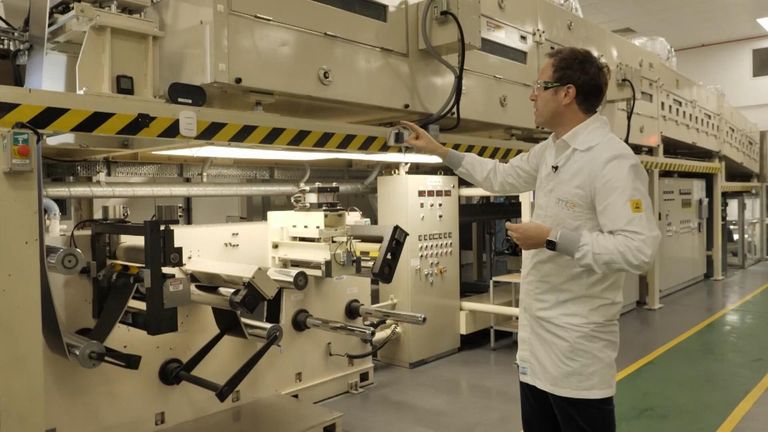Rishi Sunak and Joe Biden have agreed a new partnership to bolster economic security in response to the growing threat of China.
Brushing off his failure to deliver on the Tory manifesto promise to land a full-fat free trade deal with the US, the prime minister and US president announced the Atlantic Declaration during a meeting at the White House.
It was the first time Mr Sunak had visited the home of the American presidency.
Politics latest:
Rishi Sunak at the White House
The agreement includes a narrow trade pact covering critical minerals needed for electric car batteries, closer defence industry cooperation and a new data protection agreement.
The new accord contains an in-principle agreement for a deal on those minerals – used to make a range of products from solar panels to electric vehicles – to give UK exporters access to the huge $370bn (£294bn) green subsidies programme, the Inflation Reduction Act, introduced by President Biden to turbocharge huge green investment in the US.
Mr Biden said the US-UK economic partnership is a “source of enormous strength”.
The US signed a similar deal with Japan earlier this year to prohibit the two countries from enacting bilateral export restrictions on the minerals most critical for electric batteries – lithium, nickel, cobalt, graphite and manganese.
While the prime minister was quick to talk up the new deal, it is not the post-Brexit free trade deal the Conservative Party promised to deliver by the end of 2022 in its 2019 manifesto – when an agreement with the US was cited as the main trade deal target.
UK officials insisted this new targeted approach was a better response to the economic challenges posed by Beijing and following Russia’s invasion of Ukraine.
However, President Biden has made no secret of his disinterest in negotiating a bilateral trade deal with the UK, with negotiations now in the deep freeze until 2025 at the earliest.
Read more:
Chancellor ‘wary’ of new subsidies as companies look to US
Net zero in jeopardy unless world meets lithium and copper demands
Sunak says UK-US relationship is in ‘great shape’
Asked to acknowledge this government had failed on this election pledge on Thursday, the prime minister said the “macroeconomic situation had evolved” and insisted that the UK-US economic partnership was still strong and reflected new threats.
“Since [that pledge] we’ve had a pandemic. We’ve had a war in Ukraine and that has changed the macroeconomic situation. And the right response to that is to ensure that we’re focusing our engagement economically on the things that will make the most difference to the British people,” he said.
“The real challenges we face are the threats to our economic security.
“And actually what I’ll be talking to President Biden about today is how can the UK and the US work together to ensure that security for our citizens? I think that’s the thing that we should be focusing on right now.”
As well as the agreement on critical minerals, President Biden has committed to ask Congress to approve the UK as a “domestic source” under US defence procurement laws, allowing for greater American investment in British firms.
The two powers will also focus attention on improving the resilience of critical supply chains to shut Russia out of the global civil nuclear market. Allies are also working on semiconductor supply chains.
A deal on data protection will ease burdens for small firms doing transatlantic trade, potentially saving £92m.

